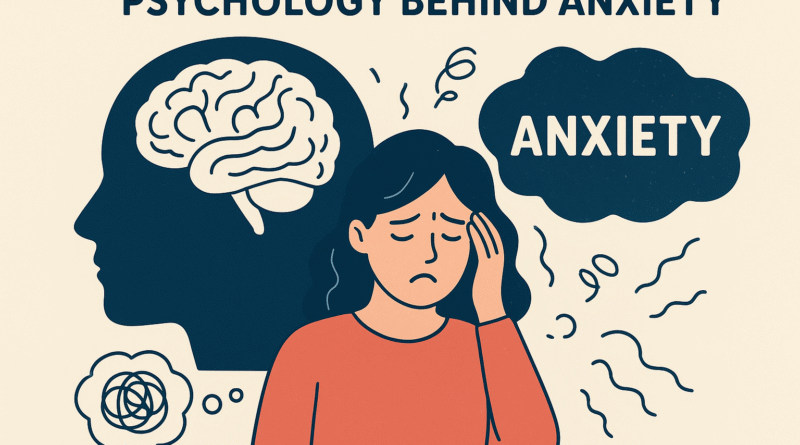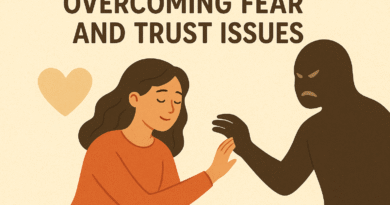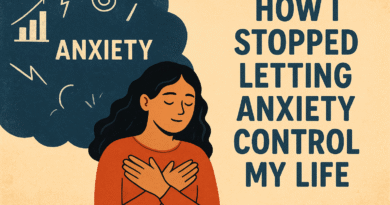The Psychology Behind Anxiety: Understanding the Mind in Stressful Times
The Psychology Behind Anxiety: Understanding the Mind in Stressful Times
Anxiety is something humans experience at some point or another. Maybe it hit before a big meeting. You are waiting for test results or when life suddenly feels uncertain. That uneasy rush in your chest, the fast heartbeats, sweating, and overthinking are similar to most of us, but what gives anxiety such power? And why do some anxiety feelings feel so intense? Why do some people seem better at staying calm?
Understanding the psychology behind anxiety helps to see it not as an enemy but as a message from your body and mind saying something needs your care and attention.
The Science of Anxiety: The Body’s Natural Alarm System
Many people think anxiety is just feeling tired, but psychologically, it’s much deeper than that. It’s your brain’s foundation; anxiety triggers the brain’s stress response system instinct. That one helped to protect your brain and potential side effects.
The moment when your brain senses danger, even if it’s just a thought, the brain’s fear center controls your emotions and hits the alarm. It releases the stress hormone like cortisol, causing your heart rate to rise, your body to tense, and your focus to reduce. It’s your body’s natural way to get ready to respond psychology behind anxiety.
In today’s world most threats do not come from wild animals or physical threats. It comes from the emotional stress, arguments, and work pressure, or a bad relationship can make your brain react as if your life were in danger. That’s why anxiety can feel too much even when nothing has gone wrong.
The Psychology Behind Anxiety
Chronic anxiety increases when the brain becomes trained to stay in alert mode. Even after the original trigger disappears, your nervous system continues to act as though danger is near.
Psychologically, this invents learned fear responses; your brain forms connections between serious situations and anxiety. For example, if you had a panic attack when driving, your brain might start connecting cars or highways with fear, even when nothing is wrong.
With time, this leads to avoidance behaviors, social gatherings, and physical symptoms like muscle problems or insomnia.
Understanding this mechanism helps explain why anxiety can be a need and why breaking the cycle requires both mental retraining and chemical balance (sometimes achieved with medications like Ambien and Xanax).
Xanax and Anxiety: Calming the Storm Within
When anxiety feels like an internal earthquake, Xanax can provide fast relief. It’s fast-acting and highly effective for short-term anxiety or panic attacks.
From a psychological perspective, Xanax helps silence the overactive emotions of the center of the brain, giving the prefrontal cortex, the rational part of your brain, a chance to regain control.
For many patients Xanax acts as a bridge. It doesn’t cure anxiety, but it creates enough calm for therapy exercises and counseling to take effect. It provides emotional stability when anxiety is high.
Still, it’s important to remember that addiction can develop. That’s what experts recommend. Xanax is part of a well-balanced method to anxiety, one that uses mindfulness, therapy, and the psychology of lifestyle change psychology behind anxiety
Ambien and Anxiety: Restoring Sleep
Sleep and anxiety share a hard relationship. Anxiety keeps you awake; sleeplessness side effects are tension and anxiety. It becomes a painful loop that weakens emotional and physical energy.
Ambien plays a unique role in this cycle. When it’s not an anxiety-reducing medication per se, it indirectly reduces anxiety by improving sleep quality. When you rest, your brain systems emotions better, and your stress hormones decrease.
The psychology behind anxiety focuses on the fact that healing sleep is one of the most powerful natural healers for a stressed mind. So, when prescribed right, Ambien helps your brain recover from anxiety-induced weakness, giving you mental clarity and emotional balance.
But as with all medications, it’s not about dependence—it’s about recovery.
How Your Thoughts Can Trigger Anxiety
The psychology behind anxiety grows stronger through patterns. It’s like a mental loop that keeps replaying tension, with one fear leading to the next, until your brain is stuck in a maze of what-ifs.
What if I fail?
What if something goes wrong?
What if I can’t handle it?
Your mind keeps reaching into the future, trying to control what it cannot project, leaving you stuck in a cycle of tension, stress, and mental health.
One of the most effective ways to calm anxiety is by understanding your thoughts and emotions. Cognitive behavioral therapy teaches you to identify, question, and replace stress- and fear-driven reactions with balanced thinking.
Managing Anxiety Without Medication
Ambien and Xanax can be important tools; they are only part of the problem. Psychology teaches us that anxiety is complex—biological, emotional, and behavioral.
To truly manage it, nurture all three.
- Emotional Connection
- Mindfulness awareness
- Healing therapy
- Balanced lifestyle
Changing Your Approach to Anxiety
The truth is, anxiety will never fade completely and that’s okay. It’s a natural human emotion, designed to protect and guide you. What changes is how you answer it to.
Understanding the psychology behind anxiety power you to work with your mind, not against it. When through therapy, medication like Ambien or Xanax, or mindfulness exercise, healing starts when you realize that calm is not something you find it’s something you build.
How Self-Compassion Supports Anxiety Recovery
Many people with anxiety are their own most severe voices. They breathe on their own for not being strong enough or calm enough.
But psychology shows that self-kindness really reduces anxiety. When you treat yourself with the same kindness you have come a friend, your brain releases oxytocin and serotonin chemicals that suggest calm and connection.
Anxiety thrives on fear, but eases with understanding.
When you stop fighting your anxiety and start listening to it, it changes from a bully into a teacher
Final Thoughts: Finding Calm in the Chaos
The psychology behind anxiety is that having anxiety does not mean you are not strong; it means you are deeply human. Every thought, every tension, and every sleepless night is part of your mind’s way of dealing with a world that often feels unstable.
But remember: anxiety does not define you. With the right understanding, treatment, and self-doubt, you can rewrite your story.
When that includes therapy, hospital healing, or medications like Ambien and Xanax, the pathwayis about balance, not perfection.
So the next time anxiety hits you, pause and remind yourself:
This feeling is just temporary. My mind is learning safety again.
And that understanding alone is the beginning of peace.




